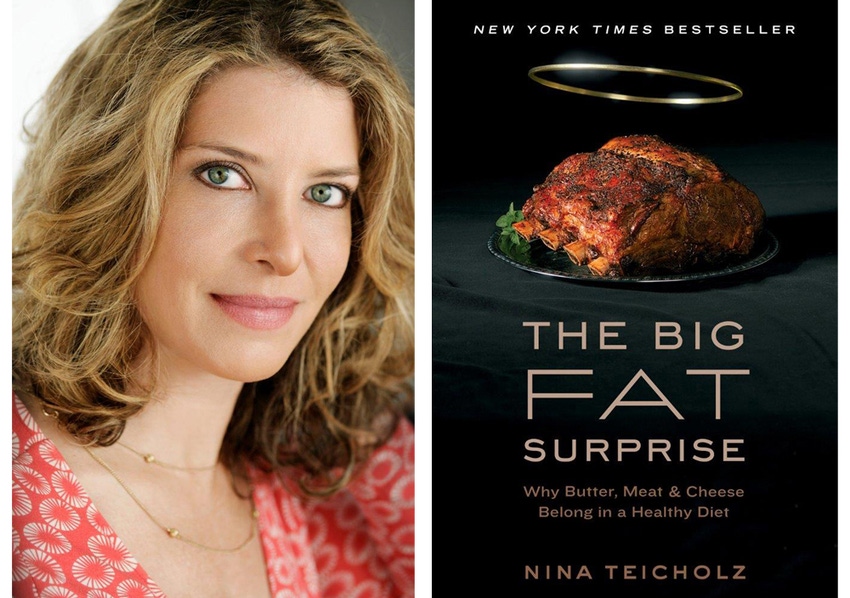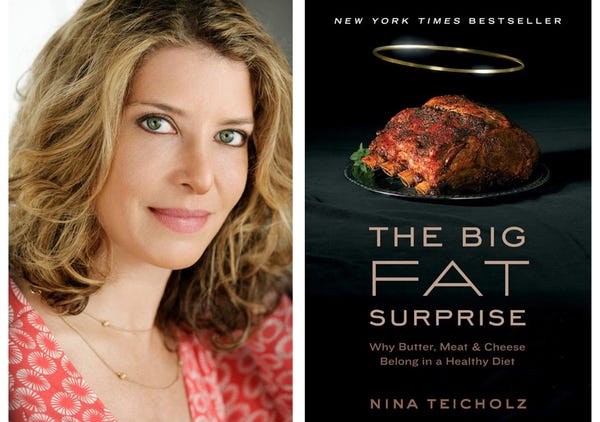Nina Teicholz, author of The Big Fat Surprise, discusses beef’s role in a healthy diet and the upcoming revision of the Dietary Guidelines for Americans.
April 20, 2015

After 10 years of reviewing the existing body of science on diet, investigative journalist Nina Teicholz condensed her findings into a New York Times best-seller titled “The Big Fat Surprise.” Here she takes a few questions from BEEF regarding her conclusions on red meat in the diet and her thoughts on the recent report of the Dietary Guidelines Advisory Committee (DGAC). Those recommendations, which call for a further reduction of red meat consumption in the American diet, will be considered in formulating the 2015 Dietary Guidelines for Americans, which will be released later this year.
What’s your bottom line to the red meat issue?
It’s that fat doesn’t make you fat; the fat you eat is not the fat you get. A higher-fat diet turns out to be healthier in every way than a low-fat diet. Higher fat and lower in carbs is a healthier diet. You don’t have to go to extremes, but you have to back out of the high-carb, low-fat diet.
The other key point is that saturated fat, which is the fat in animal foods — meat, butter, dairy, eggs and cheese — has been blamed for 50 years as the cause of heart disease. But that science has been re-evaluated and it turns out that saturated fats do not clog your arteries, do not cause heart disease, and you can eat those foods. They are healthy, good foods with a lot of nutrition

What was your initial reaction to the DGAC report?
It’s basically the same dietary guidelines we’ve had since 1980. They are a little better in that they lift the caps on dietary cholesterol, which is not because there is new science but because they are finally reckoning with the science that’s been known since the early 1980s.
But my overwhelming reaction to the report is that it’s a completely unscientific report in almost every way.
How so?
I’ve been analyzing this in great detail and there are shocking ways in which this is unscientific: inconsistent methodologies used, inappropriate conclusions drawn from the evidence, and contradictory statements. If this was a report being submitted for a Ph.D., you wouldn’t award a degree to the person submitting this report.
What are some examples?
What’s really disturbing is that the suggested guidelines don’t come anywhere near providing the nutrients that people need. The report says there is a need for concern about under-consumption in the U.S. of essential nutrients, such as vitamins A, C, D, E, calcium, potassium, folate and magnesium. Iron is also under-consumed by adolescent and premenopausal women, including women who are pregnant.
A cut of red meat is one of the most, if not the most, nutrient-dense foods you can eat. By restricting animal foods, it’s quite clear there’s no way the dietary guidelines can meet nutritional sufficiency. They are pushing America toward a plant-based diet, and you can’t get enough nutrients if you’re not eating animal foods.
What's contributed to this bias?
It is 50 years of believing in a low-fat, low-cholesterol, saturated fat-restricted diet. It’s very hard to reverse course on what has become accepted as the conventional wisdom, and that has created a bias that distorts interpretations of the science.
The largest clinical trial ever to be done on a low-fat diet, which was restricted in fat and also restricted in animal foods, found it had absolutely no positive impact on health at all, any kind of weight loss, anything. But the committee still won’t back off their low-fat recommendation.
In addition, the entire evidence review for the vegetarian diet and for eating more fruits and vegetables showed no findings of positive health benefits from eating more fruits and vegetables. They don’t have evidence for moving toward a plant-based diet.
That’s shocking given the DGAC’s emphasis on a plant-based diet.
It is shocking. This is the first time ever they started recommending a vegetarian diet as one of their healthy patterns to be recommended for all Americans — based on no hard data. And it reflects the other thing that we’re seeing, which is a growing bias against meat. There’s a real negative focus today on meat, and now it’s mainly for environmental reasons.
What’s driving this?
The environmental movement has fused with the nutritional movement and the food movement, and they’ve all kind of combined forces to create a gale storm of reasons not to eat meat. It’s been generated and developed on the urban coasts, in Berkeley and New York and Washington. They’re very divorced from the raising of animals, and generations away from seeing livestock, much less raising them.
The vegetarian movement has been growing in these centers since the 1970s. It started with ethical concerns; now there are environmental concerns. And these have kind of dovetailed with the original nutritional concerns, and there is now just an accepted consensus that meat is the worst thing you can do for your body, for the planet, and so there’s no point to meat. Coming from nutrition experts, it’s really quite amazing because the nutrition of meat is exceptional.
How do women and children fare under these recommendations?
Nutrition is about nutrients. How does your body get the nutrients it needs to be healthy? Obviously, we’re not achieving that as we have a tremendous amount of disease among children. Children’s nutritional needs are very different, as are those of pregnant women, and these differing needs are just not part of the conversation. We’ve been treating children with a diet designed to help middle-aged men prevent heart attacks.
What was your reaction to the DGAC report’s emphasis on red meat’s environmental impact?
It wasn’t part of their mandate. They’re nutrition experts, not environmental experts. I think it’s fair and right to say we need to think about the environmental impact of our food supply. That’s a perfectly fair point, but it should be studied by people who are experts in the environmental area.
Congress last fall specifically inserted language in a spending bill to prohibit the dietary guideline report from including that consideration, and the committee ignored Congress and retained that language anyway. I think it reflects this tremendous growing consensus among those who believe the environmental reasons against meat. And I think it also reflects the otherwise weak nutritional case against meat.
Do you have any personal thoughts on meat production and environment?
I think the science of meat and the environment is really in its infancy. There are a couple of reports that show meat production consumes excessive resources and contributes to global warming. But one should not make policy based on a couple of reports. It’s a science that needs a more rigorous approach. There needs to be more study.
The environment is really a separate question from what is a healthy diet. The vegetarian movement will say that a pound of meat takes so much more resources than a pound of plants, and it’s an unfair use of resources by the rich, and we should instead eat a pound of plants. To that I would say that it would be a fair argument to make if the nutrition in a pound of plants is the same as in a pound of meat, and it’s very clear that isn’t true.
How do you change that meme, or cultural thinking?
I’m not an advocate but I believe in education. There could be a movement to try to educate people about the nutritional importance of meat.
I think people who like to eat beef, or who produce it, can make the positive argument for their product. They don’t have to feel defensive, concerned or ashamed in any way about their product. It’s a nutritious food, and the data saying that it causes disease is weak to nonexistent.
In addition, this is the year that the new Dietary Guidelines for Americans will be considered and issued. There’s a political opportunity for people or groups to try to influence that process.
Editor’s note:
The Dietary Guidelines Advisory Committee report, which was issued on Feb. 19, will be utilized by the secretaries of USDA and Health and Human Services to produce the latest five-year update to the Dietary Guidelines for Americans, which will be released later this year. Those final Dietary Guidelines will serve as the basis for all federal nutrition education and program activities such as food assistance programs and the school lunch program for the next five years. The public is encouraged to weigh in with their thoughts during the comment period, which ends on midnight, May 8, 2015. Read the report and leave comments by clicking here.
You might also enjoy:
When should you call the vet on a difficult calving?
60+ stunning photos that showcase ranch work ethics
Try one of these 9 ranch management concepts to improve your ranch
How to treat lump jaw disease in cattle
About the Author(s)
You May Also Like



